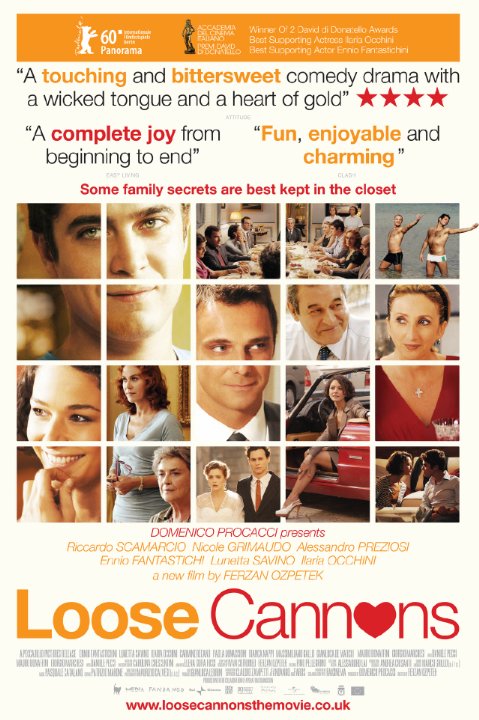Commentary: “Mine Vaganti” (Loose Cannons)
/Italian romantic comedy/drama; 111 minutes
Ferzan Özpetek, Writer & Director
The Italians Are Coming … Out!
Commentary by Mountain Shadow Director John Bennison
"You’ll never be able to extinguish your love for Antonio. The earth can’t disown a tree.”
The Tuscan girl
Let’s see. They gave us the Maserati, the Lamborghini and Ferrari.
They gave us tortellini, fusilli, vermicelli, and at least six hundred more kinds of pasta.
They gave us Botticelli, Da Vinci and Ghiberti. They gave us Verdi, Rossini and Puccini.
In fact, I can scarcely think of anything ending in the letter ‘i’ that Italy didn’t give us. And that includes the Italian romantic comedy by the Turkish (!) filmmaker, Ferzan Özpetek, Mine Vaganti.
Basic plot: Tommaso is the younger son of the Cantones, a large, traditional Italian family operating a pasta-making business. On a trip home from Rome, where he studies literature and lives with his boyfriend, Tommaso resolves to tell his parents the truth about himself. But when he’s finally ready to come out, his older brother Antonio ruins his plans with a confession of his own.
Some viewers might see the characters more as stereotypical caricatures with what -- on the surface -- seems a well-worn theme; in which case, the multiple sub-plots might seem somewhat tedious. But this ain’t Utah, and there are more loose cannons than just some campy queen scenes in Mine Vaganti.
Complexity in a film can offer both a challenge and opportunity for the viewer. When there are multiple, simultaneous plots – intermingled with flashbacks from the past – it can either become a rich tapestry or unravel in a confusing juxtaposition of messages.
There are multiple messages in Mine Vaganti to sift through, and some are poignantly conveyed.
There is the biting critique of the hypocritical social morés and local customs of provincial life, along with the worrisome preoccupation over gossip and scandal, pretense and appearances that are almost enough to do in the patriarch; who nonetheless openly enjoys the pleasures of his mistress.
There is the spinster aunt who represents the common human longing in us all to be desired and desirable.
There is the wise grandmother, who suffers through her many seasons with the eternal hope those with fewer years than she will one day come to learn what she can only bequeath – as the once beautiful Tuscan girl – her post-mortem soliloquy in the end: “Life isn’t worth living if you live without the pleasures of life.”
But from the beginning it’s not just a film about the wide variety of sexual expression of which human beings are capable. Indeed they probably exceed the varieties of pasta the Italians have been able to conjure up for us. Rather, in the end, it is about the depth of affection those representative characters might actually bear one another.
It’s about all the different kinds of ways humans seek to love one another. It’s about unrequited love, spurned and rejected love, a hunger for love that comes like a thief in the night. It’s about jealousy and betrayal, and those mysterious attractions that are more than curiosity, or even fleeting passion. And finally there’s the ease with which intimacy can rouse within one so naturally and irrepressibly that the sweet memory of it alone can be a feast, even unto death.
Mine Vaganti is a contemporary variation on the ancient tale of the prodigal journey and homecoming. The child leaves home, either by their own choosing, or gets kicked out and disowned. But home is all about that place you can return, and they won’t kick you out. So the son returns to await how the father will respond. No matter the outcome, it is always touching.
With that notion comes a suggestion to the viewer with regards to this film: Hang in there to reach the end of the last scene; to see how it resolves itself, and then flows along into the surreal visual epilogue, where past and present merge one final time to leave you with those questions worth digging deeper to explore. jb
Tommaso is the youngest son of the Cantones, a large, traditional southern Italian family operating a pasta-making business since the 1960s. On a trip home from Rome, where he studies literature and lives with his boyfriend, Tommaso decides to tell his parents the truth about himself. But when he is finally ready to come out in front of the entire family, his older brother Antonio ruins his plans.







